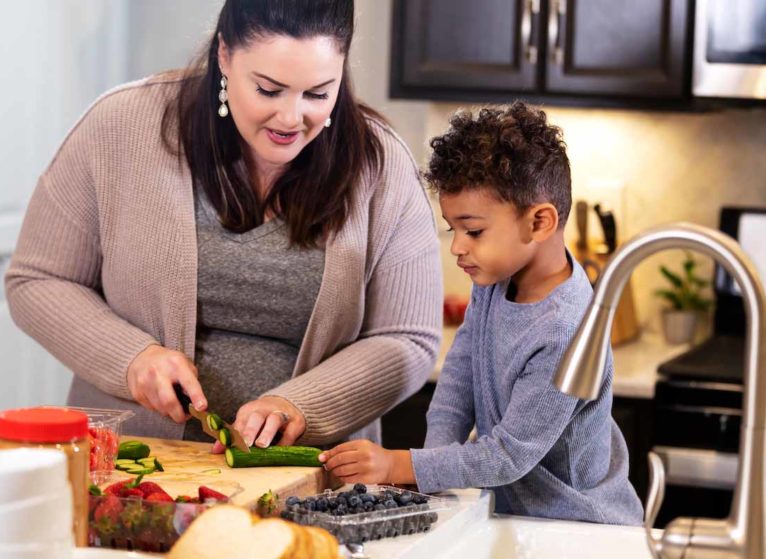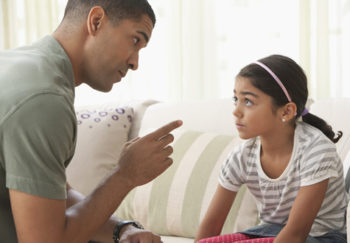We've all heard the saying, "children's brains are like sponges." They're soaking up as much information as possible while growing. So kids hearing your weight loss feelings, fears, or struggles could be sending them the wrong message. This can later shape the way they view their body size or relationship with food.
Being Careful What You Say
Psychologist Joey Tan, PhD, shares that as parents we model and teach our kids all sorts of things. Often positive things, but we also make comments or vent to others about our weight, not realizing that our kids are picking up on it too. Tan gives some examples of what to be careful saying around little ears.
What NOT to Say About Your Weight Around Kids
There are a couple of possible comments that could affect your child:
- Don't focus on the scale instead of health. People can be more or less healthy overall at different weights, depending on lots of factors like nutrition, strength, etc.
- Talking about weight or food as good or bad. This should be independent of a person’s worth.
- Don't make judgements about weight loss or gain. Don’t comment on or about another person’s loss or gain. You may not know whether someone lost or gained weight on purpose or because of grief, a health condition, or other factor.
- Making comments that communicate judgment about certain body types or sizes. This can extend to "positive" comments as well.
- All-or-nothing thinking. Don’t verbally beat yourself up or make negative comments when having dessert or skipping the gym one day. Don’t say things like “I’m being bad today.”
- Don't talk about “making up” for the occasional treat. For example, don’t say, “I have to run an extra mile later to burn this off.”
What TO Say About Your Weight Around Kids
A healthy way to frame how you talk about food or weight loss could be:
- Focus on healthy habits and talk about how they affect your health. Talk about exercising to relieve stress, get stronger, or keep your heart and lungs in good shape.
- Another alternative framing around food is to see it as a way to nourish your body and promote engagement with life. Don't focus on how the foods will lead to a change in size. Say, “I am eating this food to fuel my body and give me energy.”
- Normalize having dessert or skipping the gym once in a while. When you have a treat, focus on enjoying it, not “making up” or punishing yourself for it.
- Focus on people’s other qualities outside of body type or weight. Talk about how kind or funny someone is instead of how they look.
Changing to a Positive Mindset
The idea is to reframe your thinking from focusing on "weight" to "health." If you take a step back and think about everything involved in your overall health, we're no longer just talking about a number. Tan suggests, "ask yourself how you want to feel in terms of your health."
Most people want to do things in life without their physical health limiting them. We can have a healthy relationship with food, physical activity, and our body that doesn't revolve around weight loss and this will help your kids shape their views too. Weight changes are a side effect of changing our connection to these things rather than fulfilling a goal.
5 Ways to Help Kids Build a Healthy Body Image
Your Kids’ Nutrition: Making Healthy Food Choices
Increasing Chances of Eating Disorders
Negative attitudes on weight within a family can increase the chances of members having an eating disorder. This can happen in a couple of ways:
- Dieting: If you're constantly dieting, it may lead to kids being more concerned about their weight instead of developing a healthy relationship with food.
- Focus on weight: Teasing about weight seems harmless, but it continues that negative view and can be directed toward a child who doesn't understand.
Tan stresses many different factors cause a bad link with food, not just family. The individual, relationships with others, plus structural or environmental factors all can affect how we handle food. It's also dependent on the kinds of foods available or what's affordable.
Talking to Your Child About Their Weight
It's important not to tease them about their weight or even focus on the weight itself. Even if it's not a negative comment about their weight, it can have negative outcomes. Be mindful of comments, especially around clothing. Tan explains: like "clothes not fitting or being too tight, as this unintentionally reinforces the idea that there are 'good' and 'bad' body shapes."
Try the same approach to reframe your mindset from "weight" to "health." Focusing on weight loss won't lead to a positive body image for kids. Instead, focus on healthy behaviors as a family, like staying active, eating balanced and nutritious meals, as these are more important than looking at the numbers.
It'll help your child to want to get healthy if you lead by example. Set what the family's activity or nutritional habits should look like. Tan encourages all "to talk about health, not weight, which goes for any age. But it can be helpful to talk with them about the kinds of decisions that affect their health for when they start making on their own decisions."
Eating Disorders in Children
Children and teens who struggle with eating disorders have a fear of becoming overweight and may face depression. This disorder can cause serious health issues.
Noticing Your Child with Body Image Issues
The biggest clue your child is struggling with their body image, Tan shares, is how they talk about themselves:
- How they talk about the foods they eat
- The clothes they wear
- How they compare themselves to others
They don't always volunteer this information, so you might want to check in with their school or close friends.
Fat Shaming Your Child
Family members who fat shame could come from a well-meaning reason underneath — like they're worried about someone else's health. They may not realize the negative effects their comments have on kids or even an adult struggling with their weight loss.
If you grew up in this environment, it's best to break the cycle and reshape how your family talks about weight and food. Instead, focus on the broader definition of health and the habits that lead to being healthier.
If you have family members who continue to shame you or your child, Tan suggests setting boundaries. "Reach out to them ahead of time and talk about how you're working on healthy habits in your family and focusing on your child's weight gets in the way of being able to do that."
If it happens in the moment, shift the focus away from your child. Or, if you feel comfortable being direct with this family member, explain this isn't something you talk about in your family and set a limit on the conversation.



This article really highlights how important it is to be mindful of the messages we send to our kids, especially when it comes to body image and food. It’s so easy to make offhand comments about weight or dieting, but as the article points out, those comments can leave a lasting impact on children. It’s crucial to focus on healthy habits and the positive aspects of nourishment and activity, rather than the size of our bodies. I love the emphasis on modeling a healthy relationship with food and physical activity — one that’s about feeling good and taking care of ourselves, not about achieving a specific weight. This is such an important conversation, especially with the rise of eating disorders among kids. We have the power to change the narrative around body image by creating a positive environment at home!